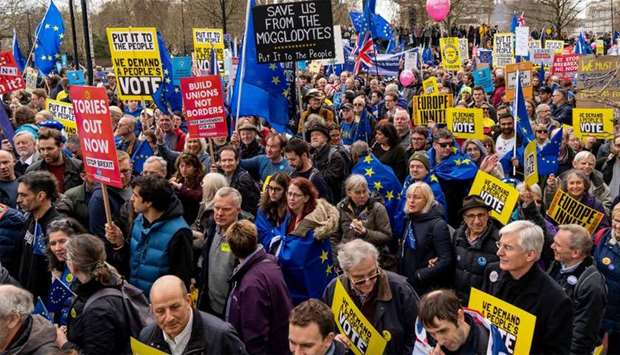*Petition calling for the whole Brexit process to be scrapped shoots past the 4-mn mark
Demonstrators from around Britain marched in London on Saturday to call for a second referendum on the country's departure from the EU, with organisers putting the number of participants at more than 1mn.
Meanwhile, a petition calling for the whole Brexit process to be scrapped shot past the 4-mn mark.
Prime Minister Theresa May is strongly against both options, but currently faces a deadlock both with parliament - which refuses to endorse her plan for Brexit - and with Brussels - which refuses to alter the deal it negotiated with May over the last two years.
A similar rally calling for a second referendum in October attracted an estimated 700,000 people.
The organisers of Saturday's march described it as one of the biggest protest marches in British history, and said it had far exceeded expectations. The police gave no figures on the number of participants.
Campaigners marched from Park Lane to Parliament Square from midday, followed by a rally in front of Parliament.
Many carried blue and yellow EU flags or were dressed in these colours, while others carried Union Jack flags.
While the country and its politicians are divided over Brexit, most agree it is the most important strategic decision the United Kingdom has faced since World War Two.
London mayor Sadiq Khan from the opposition Labour party was at the head of the march, and tweeted: "We are the people - and when it comes to Brexit we want a say over our future."
Scottish National Party leader Nicola Sturgeon said she was "proud to speak" at the march.
May has repeatedly dismissed calls for a second referendum despite parliament so far failing to agree on a deal for Britain to exit the European Union.
Parliament was set to be given a third chance at voting on her deal with Brussels in the coming week, but in a letter to lawmakers May said this might not happen after all because of a lack of support.
In the letter, May tried to increase the pressure on members of parliament, saying that unless her deal is passed, Britain may be facing a longer Brexit delay and may have to participate in the EU elections in May.
EU leaders and the British premier this week agreed to a delay, averting the prospect of Britain crashing out of the European Union on March 29.
Brussels offered London "an extension until 22 May 2019, provided the withdrawal agreement is approved by the House of Commons next week."
If it is not approved, EU leaders agreed to "an extension until 12 April 2019, calling on London to "indicate a way forward before this date" for them to consider.
Meanwhile, a petition calling for Britain to stay in the European Union had garnered over 4.25mn signatures by Saturday.
The fast sign-up rate crashed the website on Thursday.
Downing Street suggested that May is likely to ignore the petition, saying she "will not countenance revoking Article 50," which governs Brtain's departure from the EU.
In the June 23, 2016 referendum, 17.4mn voters, or 52%, backed Brexit while 16.1mn, or 48%, backed staying in the bloc.
But ever since, opponents of Brexit have been exploring ways to hold another referendum. Some opinion polls have shown a slight shift in favour of remaining in the European Union, but there has yet to be sustained evidence of a decisive change in attitudes.

